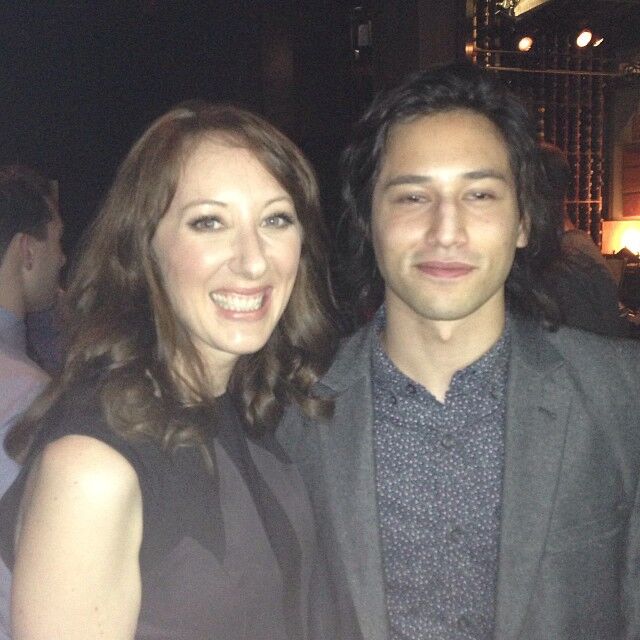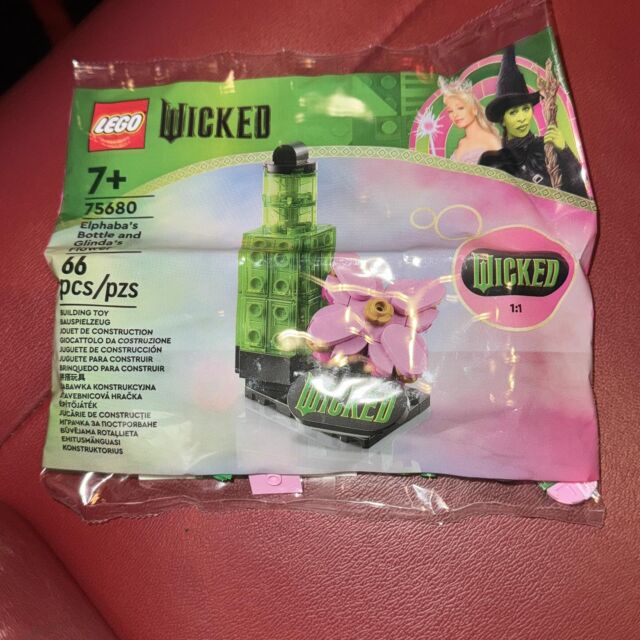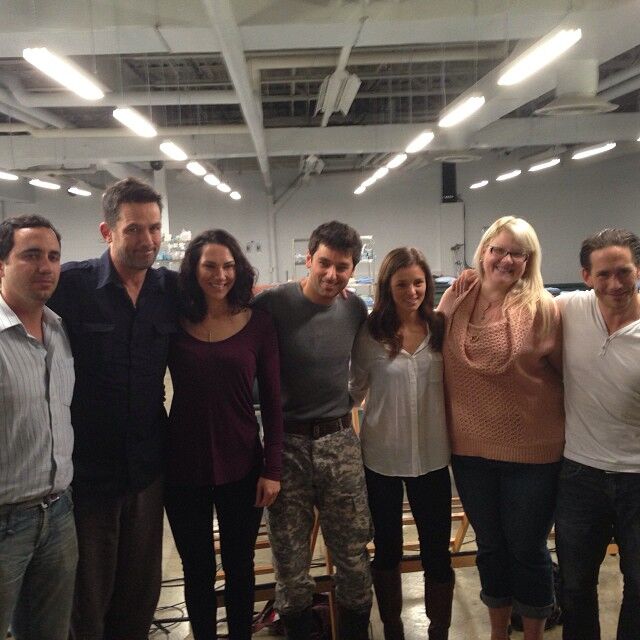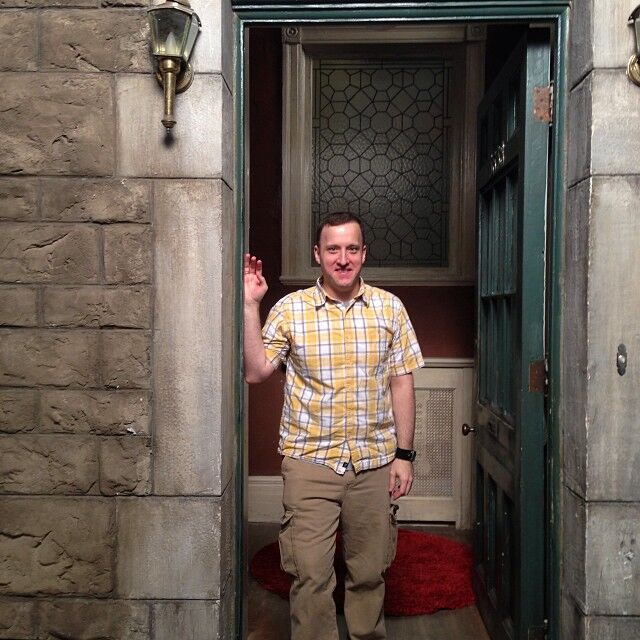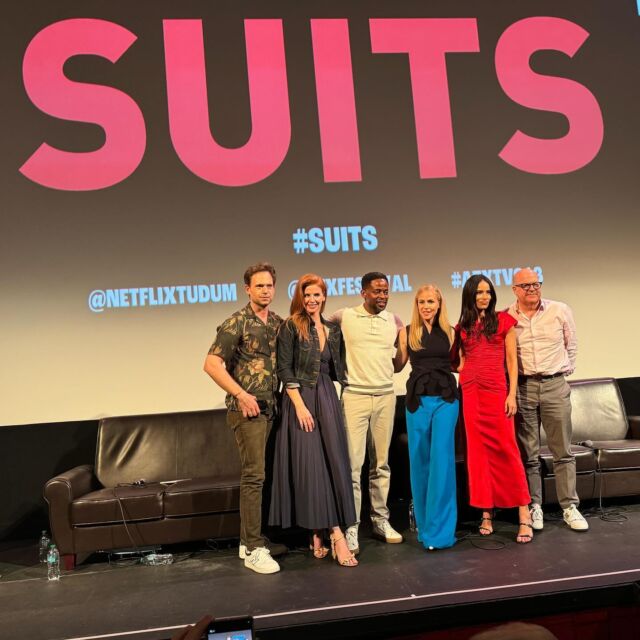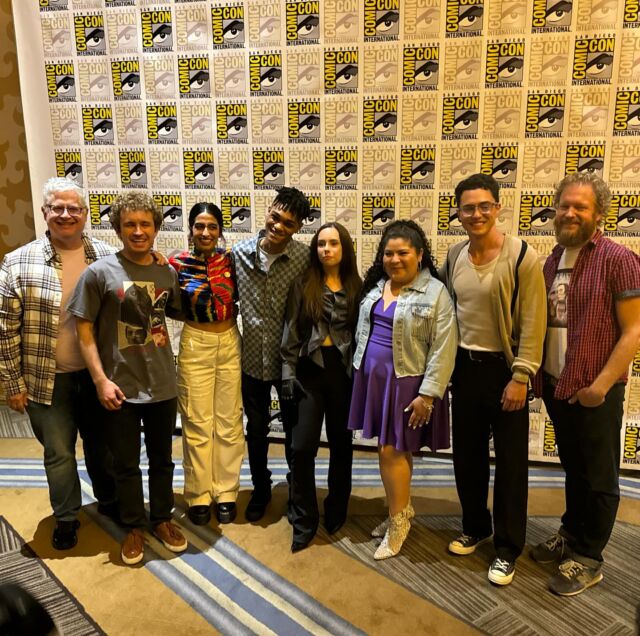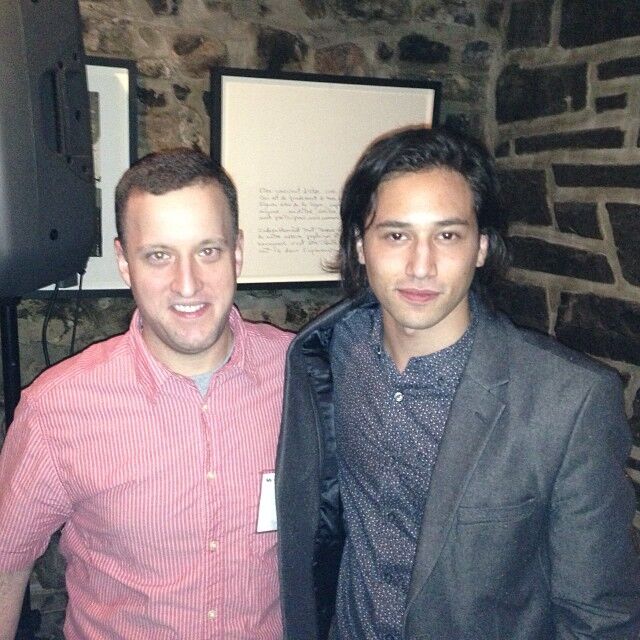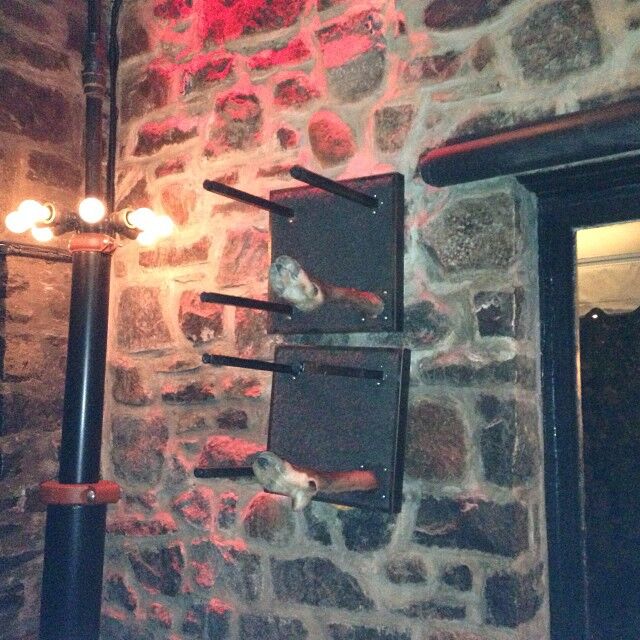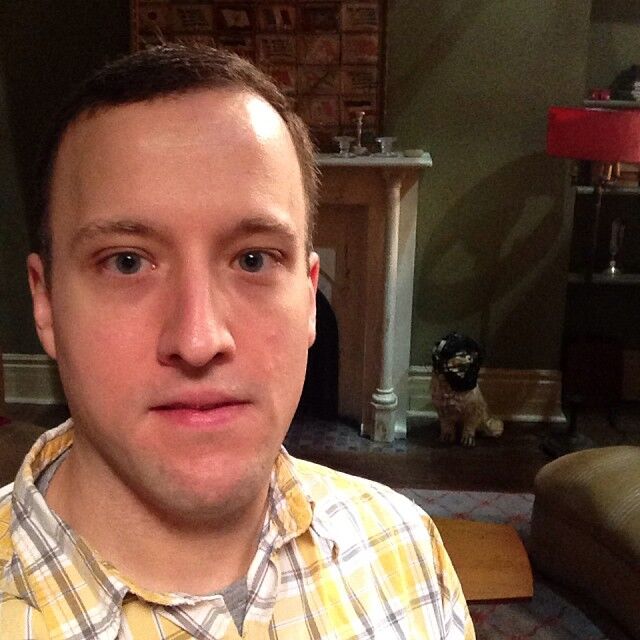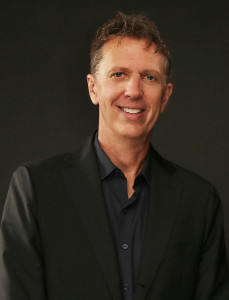 USA Network’s upcoming epic ten-part murder mystery series DIG premieres on March 5th. Recently, I got a chance to speak with Tim Kring, the co-creator and executive producer of the series. Kring is best known for creating Heroes and Touch, and he brings that same kind of interconnected storytelling to this new series. Executive Producer Gideon Raff (Homeland) was also supposed to be on the call, but he was delayed directing an episode in Croatia and was never able to join.
USA Network’s upcoming epic ten-part murder mystery series DIG premieres on March 5th. Recently, I got a chance to speak with Tim Kring, the co-creator and executive producer of the series. Kring is best known for creating Heroes and Touch, and he brings that same kind of interconnected storytelling to this new series. Executive Producer Gideon Raff (Homeland) was also supposed to be on the call, but he was delayed directing an episode in Croatia and was never able to join.
The holiest city on earth has an unholy secret… From the executive producers of Homeland and Heroes, USA Network presents DIG, a thrilling ten-part television event. Starring Golden Globe nominee Jason Isaacs and Emmy Award-winner Anne Heche.
When Peter Connelly, an FBI agent recently stationed in Jerusalem, begins investigating the murder of a young American, he realizes that he has uncovered an ancient international conspiracy that threatens to change the course of human history. Certain that the dangerous prophecy is nearing fruition, Peter must race against the clock to unravel its mystery. From a remote farm in Norway, to an enigmatic compound in New Mexico, to the serpentine tunnels of Jerusalem, this immersive, fast-paced adventure will take viewers on a quest for a truth that will shake the world’s beliefs to its very core.
Shot in contemporary Jerusalem, Croatia and New Mexico, DIG premieres on Thursday, March 5 at 10/9c on USA Network.
Here’s what Tim Kring had to say about the exciting upcoming series, which has been described as Indiana Jones meets The Da Vinci Code…
Kyle: In the show there are these three separate stories in three different locations. Can you talk about the production challenges of doing that? Did you treat them as three separate movies when you were filming them?
Tim Kring: Well, the stories were boarded together for the most part, although we did, at the very beginning, close to a year ago, start our production in Northern Canada where we shot the snowy stuff set in Northern Norway. We doubled Northern Canada for Norway.
And so that was a separate production. And then the stories start to slowly come together. We fortunately were in both Croatia and Israel as well as New Mexico. And to be really honest, we started boarding kind of everything together.
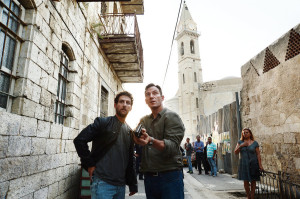 And we shot scenes that take place in Israel in New Mexico and Croatia. And we shot scenes that take place in Croatia, in Croatia. And right now we’re in Croatia, shooting scenes that take place in Jerusalem.
And we shot scenes that take place in Israel in New Mexico and Croatia. And we shot scenes that take place in Croatia, in Croatia. And right now we’re in Croatia, shooting scenes that take place in Jerusalem.
So wherever we are through the magic of production design and filmmaking, we were able to create these different locations. So the stories actually didn’t have to be boarded completely separately.
Kyle: One theme we’ve seen with your other shows like Heroes and Touch, is this idea of how everyone across the globe is interconnected. And the stories that seem separate, all come together. What draws you to this theme that seems to be central to a lot of your projects?
Tim Kring: Well I think there are a couple of things. I mean, first of all, I seem to have become very interested in the idea of how small the world really is. And this notion that what happens in one place affects someone else.
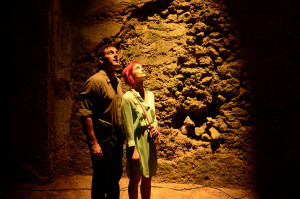 And we’re seeing that I think in our own lives, much more with a global economy and climate change and all it takes is for something to happen 10,000 miles away. And we instantly can feel it now. So it is a theme that I’m interested in.
And we’re seeing that I think in our own lives, much more with a global economy and climate change and all it takes is for something to happen 10,000 miles away. And we instantly can feel it now. So it is a theme that I’m interested in.
But I also really enjoy the kind of pastiche storytelling, of watching separate stories slowly collide with one another. I think the audience gets to participate in trying to guess, or at least try and decipher, how one story will connect with another.
And with the ten episode arc that we have on this, it works out really, really well when you introduce these stories in separate places and then watch them come together. By the end it’s all one big story.
But you’ve earned it by your participation as an audience in trying to figure out how they’re going to come together.
Kyle: There’s a lot of people binge-watching shows these days. Is that something that you take into account when you’re figuring out how to tell the story?
Tim Kring: Well I think that that has changed quite a bit in the last – since my last kind of real serialized show was Heroes. And we very much made it a week to week viewing.
So the cliffhanger became a big weapon in our arsenal, to try to get you over that six more days of waiting for the show to come back. And in many ways, that’s a very high bar to set for yourself, to have a cliffhanger that keeps the people interested.
One of the things that I – we all learned in television, everybody who has a show, for years heard the same statistic about how even the most loyal viewers of a show would only watch one out of three episodes which I, as someone who made television, I always found that hard to believe because you want to believe people who love your show are watching every episode.
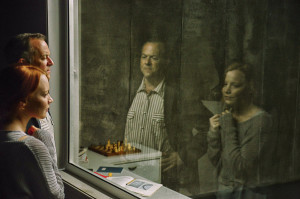 But I think statistically it was true that people who considered themselves the most loyal viewers were only watching one out of three. Well nowadays I think the most loyal viewers are actually watching every episode.
But I think statistically it was true that people who considered themselves the most loyal viewers were only watching one out of three. Well nowadays I think the most loyal viewers are actually watching every episode.
And because they’re watching every episode, you can be a little less pedantic. You can spoon feed a little less than you used to do.
We were always asked, making a serialized show before, we were always asked to explain things in the next episode that the viewers may have missed if they were just joining in now.
Well now, because of the ability to find all that information, to watch the show when you want to watch it and to find that information online with various fan sites and some chat rooms or people that do recaps and talk about the show, the audience now has I think a greater – a much greater ability to stay caught up on a show.
And so I think it has changed the way people are making these serialized shows. They can be much more seamless from episode to episode which I think is a very good thing.
It’s designed to watch, obviously, week to week on television. But, clearly designed to watch in the way that people are watching shows, however they find it.
And here’s what others asked on the call:
In the behind the scenes special you guys talked about how a lot of this comes from kind of real life conspiracies. How did you first learn about this or has this been something that’s interested you for a long time?
Tim Kring: Well I’m speaking right now, for both of us. Gideon is directing right now. It’s probably very mid-evening or late evening in Croatia, where he is doing the last few days of filming right now.
We first had this idea about a murder mystery set in the old city of Jerusalem that uncovers a deep conspiracy…that had to do with all kinds of biblical prophecies and end of days ideas.
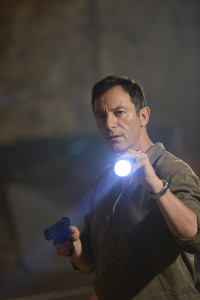 And all you have to do is do a little bit of research and a floodgate of material comes your way.
And all you have to do is do a little bit of research and a floodgate of material comes your way.
So it was really a matter of scratching the surface of it and opening up those doors and we had a researcher that we worked with on the ground in Israel as well as we–Gideon and I–did three trips to Israel where we did research.
And uncovered all sorts of very interesting real life sort of not conspiracies but prophecies and people that are still, to this day, very interested in seeing those prophecies come about.
And have institutionalized them with their various organizations and churches that are dedicated to seeing that some of these prophecies actually come true.
So it was interesting to realize that there is a very, very big and large number of people out there who are actively in pursuit of these prophecies.
Can you talk a bit about the puzzle that’s going to be connected to the show, Dig Decoded, and how that’s going to go?
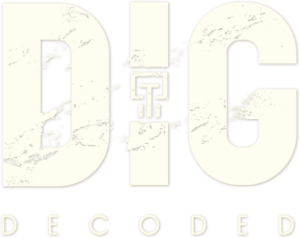 Tim Kring: Well we actually have a whole series of narrative content that lives online. And you can activate it through not only the app that allows you to interact with some of the marketing of the show, [and the] app [also] allows you to tell that story online. Uncovers a whole other layer of the narrative.
Tim Kring: Well we actually have a whole series of narrative content that lives online. And you can activate it through not only the app that allows you to interact with some of the marketing of the show, [and the] app [also] allows you to tell that story online. Uncovers a whole other layer of the narrative.
So if you are able to access it and want to access it, you can have a much deeper kind of connection to the narrative that is additive to your involvement watching the show. The idea was to try to tell a story where people actually live and they live online and they live on mobile.
And so to actually be able to push narrative for the show in all of these varying platforms that give the audience a more participatory experience on the show.
Tim, last summer you said you were hoping you’d be able to go back and shoot more in Jerusalem after the pilot, but apparently that didn’t work out. Were you able to pretty quickly change gears and move it to Albuquerque? And what parts of it just don’t work in Albuquerque that it was important to shoot it in Croatia instead?
Tim Kring: Well we are shooting a lot of the exteriors for Jerusalem in the old cities of (Split) and Dubrovnik and other places in Croatia that double beautifully for…Jerusalem. It’s kind of amazing that these smaller kind of older cobblestone walled cities – if you put the camera in the right place and you production design it in a way other than some of the signage and that sort of thing, it’s really amazing how well it doubled for Jerusalem.
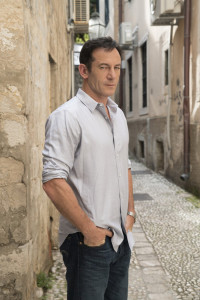 And I really defy the audience to tell when we actually are shooting one or the other. We had a storyline set in New Mexico…in the show. And while we were in Israel we were actually struggling with how to film it in Israel, trying to find the kind of iconic imagery that we always associate with the American Southwest, especially when you get out of the kind of desert environment of, you know, cafes and motels and diners and gas stations.
And I really defy the audience to tell when we actually are shooting one or the other. We had a storyline set in New Mexico…in the show. And while we were in Israel we were actually struggling with how to film it in Israel, trying to find the kind of iconic imagery that we always associate with the American Southwest, especially when you get out of the kind of desert environment of, you know, cafes and motels and diners and gas stations.
Those kinds of things were really giving us a lot of trouble in Israel. So that is one of the kind of benefits of the logistical, of having to move…a production. Suddenly that stuff became very easy. And we built sets in Albuquerque, on sound stages that we were building in Jerusalem so – in Israel. And so those were exactly the same experience when you are in a sound stage.
So all in all I think, piecing it all together, it worked out actually very, very well. Other than the little lost time of having to…restart our location, it actually ended up not being such a bad thing.
At Comic-Con last summer, you guys talked a little bit about how you wrote this project on set. Can you talk a little bit more about that and how it came together, and then how you decided where to take it and where to make this event series?
Tim Kring: Yeah. We started talking about this – we were introduced to one another, we shared an agent and we got introduced to one another. And we had both been kind of fans of each other’s work.
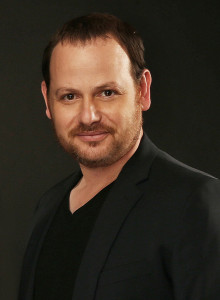 And Gideon had sort of the core idea of wanting to do a murder mystery set in what is his home town of Jerusalem, and centered on the kind of archaeological dig sites that are going on all over the city. And we really hit it off.
And Gideon had sort of the core idea of wanting to do a murder mystery set in what is his home town of Jerusalem, and centered on the kind of archaeological dig sites that are going on all over the city. And we really hit it off.
And we just decided that we wouldn’t try to sell this idea for development, that we would just write it ourselves and not go through the development process on it for any particular network’s need.
And so we started working together. And when we wrote the pilot we went out on the open market and we ended up at USA for all kinds of reasons, but not the least of which, was the guarantee of doing the whole series.
And so that was a big thing to be able to not just be in the pilot business where you’re making a pilot and then hoping it is good enough to get picked up.
The ability to be writing towards something that was actually going to be a whole series was really a big lure for us. And USA presented us with that opportunity and we jumped at it.
Are you guys thinking about what mysteries you might pursue in the future, like what the next season might look like?
Tim Kring: Well this was always written as a one off. It was designed to be a limited series.
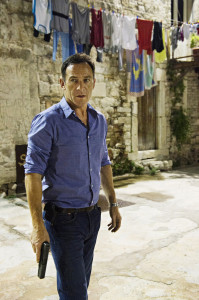 But that being said, we also knew in the back of our minds that in success this idea of a legal attaché which is an FBI agent stationed in the consulate of a foreign country who investigates crimes against and by American citizens on foreign soil, is a pretty compelling premise for a franchise.
But that being said, we also knew in the back of our minds that in success this idea of a legal attaché which is an FBI agent stationed in the consulate of a foreign country who investigates crimes against and by American citizens on foreign soil, is a pretty compelling premise for a franchise.
And so we thought about it more as a franchise than as a series. In other words, if it comes back it comes back with a whole new case, a whole new idea to explore and a whole new setting that nowadays, when this started, we were taking advantage of the country of Israel really rolled out the red carpet for us.
And I think we’re all seeing that now in production that this is a real possibility where it didn’t used to be, to be able to go and shoot in a really fabulous, exotic location.
And so, in success, if somebody wants to do this in another place and this has a premise that can be adapted for another version of this.
Can you talk a bit about the casting process?
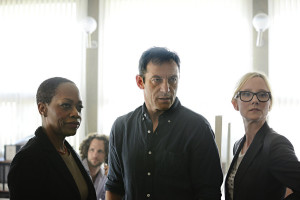 Tim Kring: Sure. Yeah. We ended up with a really – just a really fabulous cast. And it was – I have to say it was one of those casting processes that was kind of painless. Sometimes they’re very difficult. Casting can really be hard.
Tim Kring: Sure. Yeah. We ended up with a really – just a really fabulous cast. And it was – I have to say it was one of those casting processes that was kind of painless. Sometimes they’re very difficult. Casting can really be hard.
Gideon and I are able to say with completely straight faces, usually you can’t do that, in this case – in this case you can. We – we can absolutely say with a straight face that Jason Isaacs was our first choice. And, you know, we had met him while we were writing the script on spec.
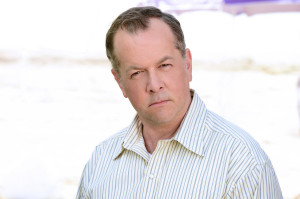 We had met him at an event and – just coincidentally. And we kind of cornered him and talked to him a little bit about the project. Unfortunately he was on a show called Awake at the time. And so he literally was just a twinkle in our eye. It wasn’t a possibility.
We had met him at an event and – just coincidentally. And we kind of cornered him and talked to him a little bit about the project. Unfortunately he was on a show called Awake at the time. And so he literally was just a twinkle in our eye. It wasn’t a possibility.
And we were sort of – from that moment on we were writing it for a Jason Isaacs type. And we kept sort of thinking of him. And sure enough, by the time we finally set up the project and got it going, Jason was available.
And so how often does that actually happen that the guy that you have in mind when you’re writing the words on paper, is actually the guy you end up casting? So that was the big part.
Then with Anne Heche and Lauren Ambrose and David Costabile and Regina Taylor, it just kind of all fell into place. And we very quickly were able to actually find these – this casting. The most exciting part of the casting process though, was casting out of Israel.
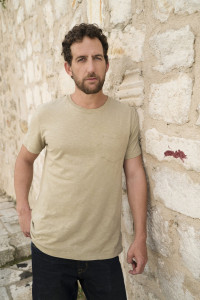 And – which was a really unique process, mainly done remotely from California, looking at casting tapes. But I will say that the depth of talent in Israel is just spectacular.
And – which was a really unique process, mainly done remotely from California, looking at casting tapes. But I will say that the depth of talent in Israel is just spectacular.
And I was very excited by it, because when I cast in LA you tend to see a lot of the same faces that are on lists for various parts.
And to be able to see a very deep bench of casting tapes for each one of these parts, you literally – sometimes there were four or five people that you could just flip a coin and choose that would have been all terrific.
And seeing all of these fabulous faces that the American audiences are just not used to seeing, was really – really exciting. And I think it’s going to add to the unique look and feel of the show. And we were able to cast some of the best actors in all of Israel. These – the people that are on the show are actually huge stars in Israel.
Is there anything else besides casting that you found either different or more difficult because you weren’t in Israel filming, but in Croatia?
Tim Kring: No. Israel has a very vibrant and deep kind of production television business over there. And it was actually remarkable just how similar their system was. And so in that respect no, the crews were terrific.
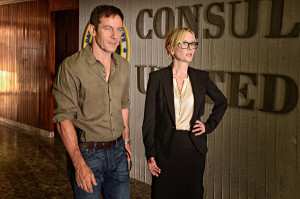 And the casting process was very similar. Again, we had trouble, we did, as I said, had this one story line that was set in the United States. And we all just sort of take advantage how certain looks for locations that you just couldn’t find there.
And the casting process was very similar. Again, we had trouble, we did, as I said, had this one story line that was set in the United States. And we all just sort of take advantage how certain looks for locations that you just couldn’t find there.
And try as we may, we couldn’t find an American diner or an American gas station that sort of thing that, like I said, when you – when we were in Albuquerque you could throw a rock in any direction and find a location.
What was it that captured you both visually about the place and just emotionally about the stories?
Tim Kring: Well the first is the visual, the visual of being in Jerusalem. When we first went on a kind of a research trip together everything changed for me. It suddenly – the actual feel of being in a city that’s 3000 years old and where history is everywhere.
And in terms of the actual locations, we were filming in places that literally not only have they not been filmed in but the public was not allowed to go into.
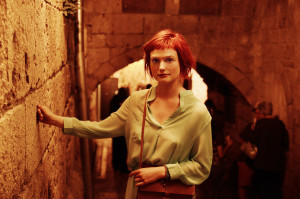 And so when you are walking on stones that people have been walking on continuously for 3000 years it’s really kind of amazing. And the wonderful thing about it was that I was so used to – I’ve shot most of my shows in Los Angeles.
And so when you are walking on stones that people have been walking on continuously for 3000 years it’s really kind of amazing. And the wonderful thing about it was that I was so used to – I’ve shot most of my shows in Los Angeles.
And any part of the world that we’ve been in, we’ve doubled Los Angeles for it. So we put a green screen up and we production design an alley to look like a market in Tokyo or something.
And everything is fake and everything is production designed and everything is computer generated. And you have to paint out the palm trees or whatever, that sort of thing.
And to actually go and be able to point the camera in a direction and have everything be authentic was really just amazing.
And then to be in a city like I said, like Jerusalem, where you feel that – not only that history but the tension and the collision of these major religions that are all stacked on top of one another – the Church of the Holy Sepulcher, the Temple Mount, the Al-Aqsa Mosque, they’re all within a half mile of one another.
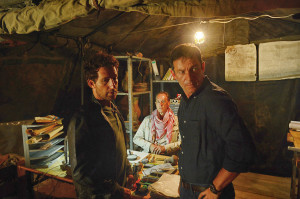 They literally, you could walk from one to the other in three minutes. And so all of the things that we had been sort of speculating about on the script suddenly became very, very real.
They literally, you could walk from one to the other in three minutes. And so all of the things that we had been sort of speculating about on the script suddenly became very, very real.
So and, like I said, we immersed ourselves very much into the history of the place and went to all of these archaeological digs and met with various consultants. And it’s one of those things where I think back and I can’t remember not knowing about these things.
Because they’re really very much in the front of my mind now.
What struck you about the stories?
Tim Kring: Well one of the themes that we are dealing with is fanaticism and the length that people will go for their beliefs. I have had a long fascination with a lot of this stuff.
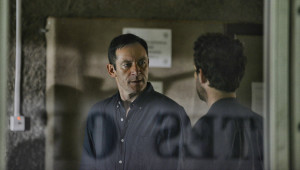 I was a Religious Studies major in college and have always been very interested in what people find meaning in and how they find meaning in a complicated world.
I was a Religious Studies major in college and have always been very interested in what people find meaning in and how they find meaning in a complicated world.
So for me, it was about actually immersing myself in the real places where I had read about, and grown up studying some of this stuff. But, you do find that fact is stranger than fiction.
And that people are still very much pursuing some of these prophecies is both sort of exciting and gives you pause at times.








